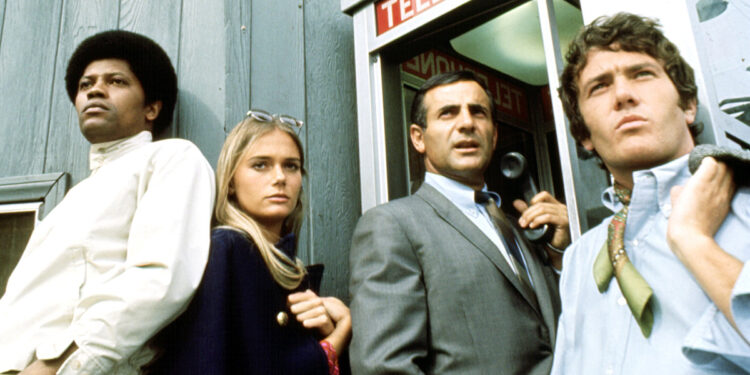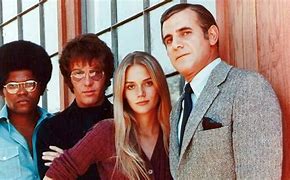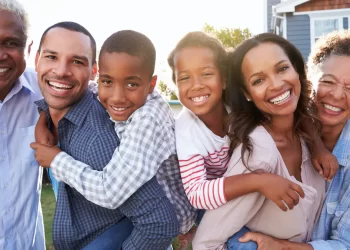By: Greg Rector
In September of 1968 a new type of “Crime Drama,” hit the airwaves on ABC television. Three troubled youths “One black, one white, one blonde,” The Mod Squad broke the mold of the typical police drama. Michael Cole who played Pete Cochran on the left was a long-haired rebellious son of wealthy Beverly Hills parents who was caught stealing a vehicle arrested and placed on probation. Clarence Williams III was Lincoln Hayes one of a family of 13 kids who got caught up in the Watts riots and also arrested and placed on probation. Finally, Julie Barnes portrayed by Peggy Lipton was arrested for vagrancy after running away from her San Francisco (the epicenter of the hippie/flower-child culture), prostitute mother’s home. Basically, the three lead actors represented everything that the man running for the Presidency in 1968 for the Republican Party and who would win namely Richard M Nixon was running his platform on, the fear of the so-called counterculture. The show debuted in the aftermath of race riots, the Democratic National Convention that turned so violent, and months after the assassinations of Dr. Martin Luther King (April 4th) and Senator Robert Francis Kennedy (June 5th), the anti-war protests were also in full swing over American involvement in Vietnam.
Enter Captain Adam Greer (Tige Andrews) a tough but sympathetic cop who would convince the three to work with him as unarmed undercover detectives. For five seasons “The Mod Squad,” would tackle topics that other shows would never come close to touching. Because the three members of the squad could in Captain Greer’s own words “They can get into places we (the regular police) can’t,” the Mod Squad could because of their youthfulness infiltrate a high school to help solve the murder of a teacher, or an underground newspaper that led to the capture of a bomber (Yes bombings were relevant and occurred at this time), Greer recognized “the times are changing,” and on a weekly basis this show dealt with abortion (years before Roe V Wade 1973) child abuse, illiteracy, domestic unrest from both the Vietnam War and the racial strife, sex education, and returning soldiers from Vietnam ( PTSD long before the name was around), police brutality, euthanasia was even one of the topics they would tackle. The biggest thing about the three youths was a mandate from famed TV producer Aaron Spelling, that this show would be about the relationships of the people involved and that The Mod Squad “Would never arrest kids…or carry a gun or use one.” The show was actually based on a real unit that had been formed in the 1950s to deal with the growing narcotics problem at that time.
As a kid, I never missed an episode of “The Mod Squad,” it was as NBC would later use as a slogan “Must See TV,” I would watch the show either at home or more often than not with my next-door neighbors especially my babysitter Tonya an African-American girl and her grandmother a woman who I absolutely adored and who on both of those horrible nights in 1968 when Dr. King and Senator Kennedy were murdered, she held me in her arms for hours on end as her own grandkids were much older. That’s probably why for years my favorite character on TV was Lincoln Hayes, not only was Linc simply the coolest guy on TV known for using the popular slang of the day such as “Solid,” and “Keep the Faith,” but his humanity and kindness would shine through in so many of the episodes. Despite the controversial nature of the topics the show dealt with my more conservative parents always found there was a “life lesson,” or as many now say a “teaching moment,” in every episode of The Mod Squad. Imagine that from 1968 to 1973 in Canada, I was learning about life not just at home but from what was always a second family to me.
Pete Cochran (Michael Cole) never really hit home for me as a character. He was I later learned the “eye candy,” for the young female audience. Something I was not worried about at a young age. Julie was the other character I absolutely adored. If she was in danger I would be instantly upset and afraid for her. Like many other characters on TV when you’re young the inevitable “crush,” was definitely there when it came to Julie. My parents would tease me years later because if Tonya wasn’t available to babysit I asked if Julie Barnes could instead.
Years later when we had access to things like DVDs or Blu-Ray discs, I went out and bought the series when it was made available. Because the show was so centric to its time, sadly The Mod Squad doesn’t age well. It’s definitely a case of “You had to be there.” This was definitely brought home in 1999 when MGM made one of the worst films I have ever seen (I walked out of the theatre) “The Mod Squad,” a movie starring Omar Epps as Linc Hayes, Gionavi Ribisi in the Pete Cochran role, Claire Danes as Julie, and the cop of all cops in the 90s Dennis Farina as Captain Greer. It was absolutely horrible. Like so many other attempts from Hollywood to remake something have been. Twenty-six years had passed since the show was canceled but none of the new actors could touch the original cast for me. Many of my friends felt the same.
The impact of The Mod Squad on many of us coincided with Julia (Diahann Carroll), television’s first African-American woman who wasn’t typecast ( A nurse and single mom), I Spy (Culp and Cosby), Star Trek (Yes that first interracial kiss), Room 222 (Integrated High school), The Flip Wilson Show, all which had African-American stars and featured those characters having equal-footing with their white counterparts. The thing I remember most from that time? These shows proved the words of Dr.King in his famous 1963 “I have a dream,” speech and his hopes for his children’s futures, that the color of the skin didn’t matter it was the content of their characters that did matter. Unfortunately, as we all can recognize those lessons didn’t take for everyone, it did with many of us though.
When both Clarence Williams III (2021) and Peggy Lipton (2019) both passed I found myself rewatching episodes of The Mod Squad. If you can get past the generational aspect (the late 60s & early 70s), you will find five seasons of terrific television and indeed those “Life Lessons,” as well. You might also find yourself learning that the so-called “Baby Boom,” generation that is often maligned today wasn’t all bad. Far from perfect, but many of us aren’t the villains we’re made out to be either. We are the generation that embraced diversity. Both in the make-believe world of movies and television and for so many of us in our daily lives.


 NFL
NFL



